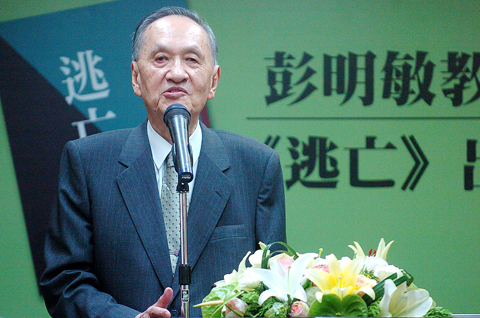On Sept. 20, 1964, Peng Ming-min (彭明敏) was arrested for treason for advocating democracy in Taiwan. He was sentenced to eight years in prison in 1965 and put under house arrest later the same year after receiving a special pardon.
On Jan. 2, 1970, Peng left his family and began a 22-year exile.
At a book launch in Taipei yesterday, the 86-year-old shared his successful escape from the then-Chinese Nationalist Party (KMT) regime 39 years ago, which he describes in his book titled A Perfect Escape.

PHOTO: GEORGE TSORNG, TAIPEI TIMES
“I often ask myself: If I had made a different decision, what would have become of me?” Peng, former senior presidential adviser under the Democratic Progressive Party administration, told an audience yesterday.
After Japan’s defeat in World War II, Peng, who at the time was studying political science at the University of Tokyo, had to decide whether to stay in Japan or return to Taiwan.
If he had stayed in Japan, he would have had to change his Chinese name and would probably have ended up teaching, practicing law, writing or working in the public sector, Peng said.
“But I loved this country [Taiwan] so much that I wanted to go home … It did not take me long to decide,” he said.
Filled with patriotism and ideals, Peng was in for a major disappointment after he saw how the KMT was governing Taiwan.
Peng returned to Taiwan in 1946 and studied political science at National Taiwan University. In 1951, he obtained a scholarship to study at McGill University in Montreal. He was offered a job there, but turned it down. He studied law at the University of Paris and obtained a doctor of laws degree in 1954.
Peng said the KMT government tried to recruit him after his return from Paris. But after witnessing the 228 Incident, the imposition of Martial Law and the White Terror, he had to decide between serving under the KMT and securing wealth and status, or following his conscience and fighting for freedom and democracy.
In 1964, Peng was arrested along with two of his students, Hsieh Tsung-min (謝聰敏) and Wei Ting-chao (魏廷朝), for publishing the Declaration of Formosan Self-Salvation.
For his own safety and that of his family, Peng said he decided to flee the country. With help from various individuals — Peng said he had to be careful with details in the book to protect the privacy of individuals and respect the wish of those who helped him but wanted to remain anonymous — his escape took him through Hong Kong, Bangkok, the Soviet Union and Denmark before he arrived in Stockholm, where he was granted political asylum.
Peng later moved to the US with held from his friends and joined the campaign for Taiwan independence.
Peng yesterday lamented the dramatic change in Taiwan’s political climate since President Ma Ying-jeou (馬英九) was elected last year, saying the country seemed to be gradually returning to the old days when the KMT was in power.
“Can we accept that the eight years of freedom and democracy we enjoyed were just a short episode? Is it normal to have a foreign regime govern this land? We must carefully think about that,” he said.

Chinese Nationalist Party (KMT) Chairman Eric Chu (朱立倫), spokeswoman Yang Chih-yu (楊智伃) and Legislator Hsieh Lung-chieh (謝龍介) would be summoned by police for questioning for leading an illegal assembly on Thursday evening last week, Minister of the Interior Liu Shyh-fang (劉世芳) said today. The three KMT officials led an assembly outside the Taipei City Prosecutors’ Office, a restricted area where public assembly is not allowed, protesting the questioning of several KMT staff and searches of KMT headquarters and offices in a recall petition forgery case. Chu, Yang and Hsieh are all suspected of contravening the Assembly and Parade Act (集會遊行法) by holding

PRAISE: Japanese visitor Takashi Kubota said the Taiwanese temple architecture images showcased in the AI Art Gallery were the most impressive displays he saw Taiwan does not have an official pavilion at the World Expo in Osaka, Japan, because of its diplomatic predicament, but the government-backed Tech World pavilion is drawing interest with its unique recreations of works by Taiwanese artists. The pavilion features an artificial intelligence (AI)-based art gallery showcasing works of famous Taiwanese artists from the Japanese colonial period using innovative technologies. Among its main simulated displays are Eastern gouache paintings by Chen Chin (陳進), Lin Yu-shan (林玉山) and Kuo Hsueh-hu (郭雪湖), who were the three young Taiwanese painters selected for the East Asian Painting exhibition in 1927. Gouache is a water-based

Taiwan would welcome the return of Honduras as a diplomatic ally if its next president decides to make such a move, Minister of Foreign Affairs Lin Chia-lung (林佳龍) said yesterday. “Of course, we would welcome Honduras if they want to restore diplomatic ties with Taiwan after their elections,” Lin said at a meeting of the legislature’s Foreign Affairs and National Defense Committee, when asked to comment on statements made by two of the three Honduran presidential candidates during the presidential campaign in the Central American country. Taiwan is paying close attention to the region as a whole in the wake of a

OFF-TARGET: More than 30,000 participants were expected to take part in the Games next month, but only 6,550 foreign and 19,400 Taiwanese athletes have registered Taipei city councilors yesterday blasted the organizers of next month’s World Masters Games over sudden timetable and venue changes, which they said have caused thousands of participants to back out of the international sporting event, among other organizational issues. They also cited visa delays and political interference by China as reasons many foreign athletes are requesting refunds for the event, to be held from May 17 to 30. Jointly organized by the Taipei and New Taipei City governments, the games have been rocked by numerous controversies since preparations began in 2020. Taipei City Councilor Lin Yen-feng (林延鳳) said yesterday that new measures by